


On September 9, 2021, the White House announced that it would ask OSHA to develop an Emergency Temporary Standard (ETS) to "reduce the number of unvaccinated Americans by using regulatory powers and other actions to substantially increase the number of Americans covered by vaccination requirements." Accordingly, the ETS would direct businesses with 100 or more employees to require COVID-19 vaccines or weekly testing among employees and impose fines on employers for compliance violations. Officially, OSHA has yet to respond to the White House request (other than a general Webinar and a timeframe of "weeks"); however, if the development of this new ETS follows the same trajectory as the OSHA ETS for Healthcare, that process took six months.
In addition to the current OSHA COVID-19 standards, multiple states have drafted similar guidance or introduced regulatory changes. Additionally, some employers have begun to require vaccinations with the allowance of reasonable accommodations for medical conditions (under the Americans with Disabilities Act [ADA]) and religious beliefs (Title VII of the Civil Rights Act of 1964). Because of the complex labor law scenarios involving the ADA, Title VII, Genetic Information Nondiscrimination Act (GINA), and various state regulations, it's best to consult with a knowledgeable labor law attorney when looking to mandate vaccines.
So what are companies to do now that we're in this state of limbo between the next ETS?
Here at Aspen, we suggest staying the course of face coverings, distancing (where required), and other current requirements, regardless of vaccination status. This approach maintains equal respect and safety for everyone irrespective of vaccination status, medical condition, or religious belief. For some companies in states that offer the option of allowing fully vaccinated employees to go without a mask, be cautious that you don't risk violating OSHA's more strict regulations requiring masks for both vaccinated and unvaccinated individuals.
We still believe that actions to "separate" employees (vaccinated from unvaccinated) can destroy a safety culture and even cause a breakdown in employee relations. Segregating employees goes against fundamental workplace safety principles. Safety policies are for all like-employees and not for one group of employees over another. (As an FYI, we know that vaccinated people can still get sick, and it is the safety responsibility of an organization to prevent injuries and illnesses, regardless of severity. It is also a fundamental tenet of OSHA).
Lastly, CDC and OSHA rules for health care workers and outdoor/trades/etc. are more strictly regulated and require additional actions.
Resources
OSHA COVID Guidelines: https://www.osha.gov/coronavirus/safework
Path out of the Pandemic: https://www.whitehouse.gov/covidplan/
If you have questions or client concerns, feel free to reach out to the Aspen team at aspenteam@aspenrmg.com.





